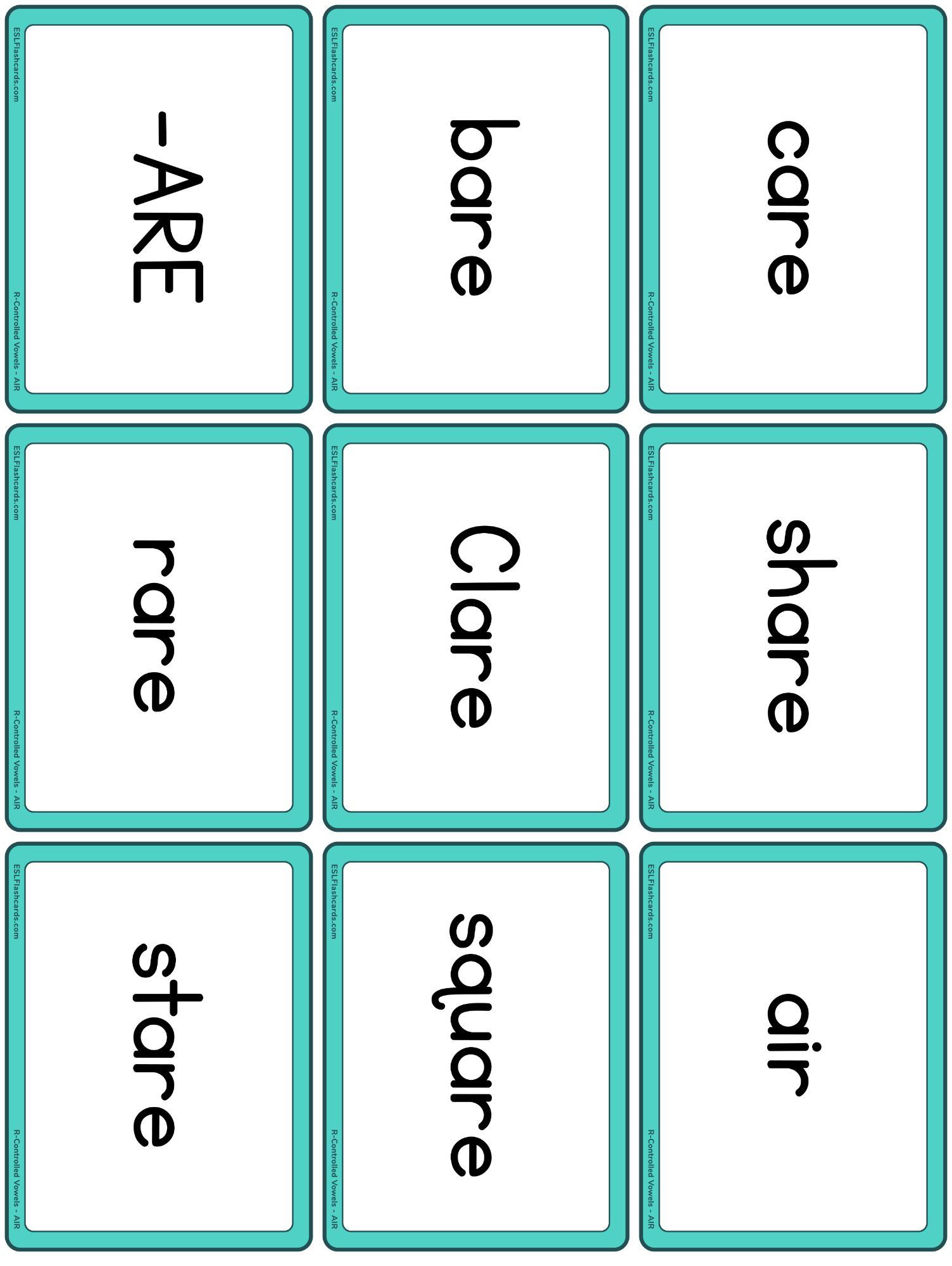Description
Arg! You’ve taught all the basic letter sounds, maybe some blends and digraphs. Your students can read 3-letter words with short vowel sounds swiftly and are sorting out long vowels, too. But then, bam. Smack an R after a vowel and you can’t call that long or short.
The letter R alters the vowel sound enough (at least in American English) to warrant a separate lesson in pronunciation. Here are 120+ printable word cards to help you teach r-vowels. They’re divided into 6 sets: AR, ER, IR, OR, UR and AIR-rhyming words.
The 6 sets of cards represent 4 different vowel sounds. AR, OR, and AIR are decidedly different sounds. Although ER, IR, UR make the same sound, we are listing them as separate sets for the purpose of teaching spelling patterns. Those three could be combined into one lesson.


1 Page
27 cards.
1-syllable words containing the sound /ɛr/ (air) spelled -AIR and -ARE. There is also a small group of words with mixed spellings.
Words
-ARE, bare, care, dare, fare, blare, flare, share, stare, square, -AIR, air, fair, hair, lair, pair, chair, stair, -EAR, bear, pear, tear, wear, swear, /ɛr/, err, heir, prayer, their, they’re, there, where


3 Pages
27 cards.
3-, 4-, and 5-letter words containing the sound /ar/.
A few words have consonant blends or digraphs.
Words
AR, ark, art, bar, car, far, jar, bark, Bart, Carl, card, dark, fart, farm, harp, lard, Mark, park, part, star, tarp, yarn, chart, quark, march, smart, shark, start


2 Pages
18 cards.
1- and 2-syllable words containing /er/, spelled ER, as a final or middle sound.
Words
ER, her, herb, herd, fern, Bert, over, after, Amber, baker, better, clerk, flower, finger, sister, tiger, winter, iceberg


2 Pages
18 cards.
Mostly 1-syllable words containing the sound /er/ spelled IR.
A few words have consonant blends or digraphs.
Words
IR, fir, sir, bird, dirt, girl, firm, stir, birth, dirty, first, skirt, shirt, swirl, smirk, third, twirl, thirsty


3 Pages
25 cards.
Mainly 1-syllable words containing the sound /or/.
A few words have consonant blends or digraphs.
Words
or, for, born, cord, cork, corn, horn, form, fork, more, port, worn, sore, forty, north, porch, torch, sport, storm, snort, short, store, story, scorch, airport


2 Pages
17 cards.
Mainly 1-syllable words containing the sound /er/ spelled UR.
A few words have consonant blends or digraphs.
Words
UR, fur, burn, burp, blur, curl, hurt, purr, turn, curly, burnt, burst, purse, slurp, church, purple, Saturn




Chantal –
Thank you for such a great resource! Something I can really use, and saves a lot of time if I tried to make my own. Thank you again
Karen –
Glad to hear that! 🙂
Deborah –
Thanks for sharing. Very useful for ESL students.
mubina –
Thanks. Great for group work.
Karen –
You’re both very welcome!
glenda w. –
Thank you so much for these amazing flash cards! It’s a constant search for me, to come up with new ones!
Karen –
I’m glad to hear they save you time 🙂
Tonya –
really great! thanks a lot!
Chloé –
Hi, I am teaching to non English kids just starting this new language. I heard it’s better to start with oral and vocabulary, then go on reading-writing. Do you think your flash cards are ok to use even if the kids don’t understand the words meaning? Are the cards only for reading or the kids should write-copy the words of the flash cards or train their writing with vocabulary they know better? Thank you
Karen –
These cards are collected into sets for teaching sounds, pronunciation, and spelling patterns. There is no other theme in the sets, so I would not use them primarily for teaching vocabulary.
I would pick out the cards I think the students are most likely to understand already, such as ‘bird’ and ‘girl’, and omit the words that would be too hard to explain based on the level of the students.
In my classes, I would not spend any time having students copy words whose meaning I wasn’t teaching. That said, depending on the age of your students, you could use the unknown vocabulary cards to practice using a dictionary and/or making a glossary in their notebooks. I wouldn’t do more than a couple new words at a time this way, though.
Here’s an article about the pros and cons of teaching phonics in ESL classes:
https://busyteacher.org/16913-teach-phonics-esl-classroom.html
Hope that helps!
Chloé –
I was thinking the same : to select only some words. And having only a few words they don’t know but will try to spell and pronounce and add in a glossary is a good idee, I think.
The article is really interesting too. So, in my case, I will use the phonics to explain some rules and give some reading tools only.
Thank you for your help !
Karen –
You’re quite welcome! Have fun 🙂
Marat –
It’s just great!
Cinthia Morales –
Excellent resource. thank you for sharing.
Karen –
You’re welcome!
Dharmambigai Muralitharan –
Awesome. Thank you for sharing such a wonderful downloadable resource to practice sounds.
minsun –
thank you~~
minsun –
thank you
Luiza –
Thanks a lot!
Jody Spain –
great
Divina Hamazaki –
Great help for this resources. Wonderful.
Anne –
Excellent resource, neat, easy to read
Deborah –
These graphemes are a challenge for native speakers, thanks for creating a resource!
Nicole –
These are a great resource! I’m teaching my son how to read and I know that these simple yet effective tools will really help him along. Thank you!
Karen –
You’re welcome! My nieces and I like to play the memory matching game with small sets of these ones. Have fun!
T Wade –
Perfect for progress monitoring!